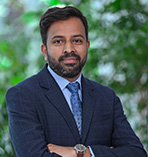
Khalifa University
Dr. Nilesh R. Chodankar completed a B.S. (2011), M.S. (2013), and Ph.D. (2016) in materials science from Shivaji University, India. He has been an assistant professor of energy and materials engineering at Dongguk University, South Korea. He is currently a research scientist at Mechanical & Nuclear Engineering, Khalifa University, Abu Dhabi, UAE. His research focuses on the design and synthesis of functional materials, innovation of devices for electrochemical energy storage and conversion applications, including next-generation aqueous storage systems (for example, Zn-ion, Al-ion, and non-metal ion systems), supercapacitors, electrocatalysts (water splitting), to generate best-in-class performance and compete with expensive technologies/commercial materials for real-world applications. In addition, he is focused on the design and development of different biocompatible materials for implantable and safe energy storage systems for advanced implantable electronic medical devices. To date, he has co-authored more than 100 refereed journal articles, five domestic or international patents, several book chapters, edited two textbooks, and over 6000 Google Scholar citations.
The world is predicted to face a lack of lithium supply by 2030 due to the ever-increasing demand for electrochemical energy storage (EES) systems, which creates the urgency to develop a more sustainable post-lithium yet safe and green EES system. An alternative EES system that uses Earth-abundant metals, such as the multivalent metal ion-based EES systems, has recently gained much attention because of its safety and sustainability, high theoretical capacity, and natural abundance in the Earth’s crust. Zn-ion batteries (ZIBs) and capacitors (ZICs), in particular, have achieved and shown great potential for stationary energy storage systems owing to their low cost and safer operation. However, the practical applications of the Zn-ion system have significantly been impeded due to the gap between the breakthroughs achieved in academic research and industrial developments. In addition, the commercialization of the Zn-ion system is confronted with many challenges, such as the two-electron transfer reactions, dendrite formation on the Zn-anode, and instability of the conventional MnO2 cathode. This talk will cover the approaches used to overcome the limitations of the Zn-ion system by utilizing simple 2D carbon-based materials and low-cost additive electrolytes towards the sustainable goal. In addition, the innovations in the implantable EES system using advanced 2D materials with a self-charging approach will be covered.